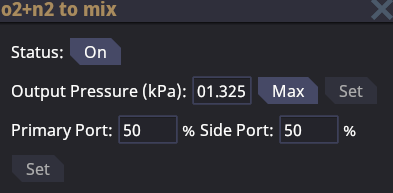Pipes and vents: Difference between revisions
m →Pumps |
m →Pipes |
||
| Line 21: | Line 21: | ||
! Image !! Name !! Description | ! Image !! Name !! Description | ||
|- | |- | ||
| [[File:Pipe straight.png | | [[File:Pipe straight.png]] || gas pipe straight || A straight segment of pipe. | ||
|- | |- | ||
| [[File:Pipe elbow.png | | [[File:Pipe elbow.png]] || gas pipe bend || A elbow segment of pipe. | ||
|- | |- | ||
| [[File:Pipe 3 way.png | | [[File:Pipe 3 way.png]] || gas pipe T junction || A three way junction segment of pipe. | ||
|- | |- | ||
| [[File:Pipe 4 way.png | | [[File:Pipe 4 way.png]] || gas pipe fourway || A four way junction segment of pipe. | ||
|} | |} | ||
<!-- add exotic box --> | <!-- add exotic box --> | ||
Revision as of 08:31, 17 May 2022
WIP
General Information
All gases can flow through the various pipes found in the game. Gas generally flows from higher pressure to lower pressure. If a gas is not in a pipe, canister, or tank, it will be in the atmosphere and will interact with other objects.
If pressurized pipes get unwrenched they will dump all of their contents into the surrounding atmosphere and will, depending on the pressure level, violently blow the wrench user away. You will know if you are unwrenching a pressurized pipe if you get the message stating "A gush of air blows in your face... Maybe you should reconsider?" Alternatively, you should always use your gas analyzer on every pipe before unwrenching.
All pipes can be unwrenched to disconnect them from others. By using a welder on a unwrenched pipe segment you can deconstruct it into steel.
A broken or unconnected segment of pipe WILL NOT allow gas to pass through. Do not worry about all your gas escaping out of a broken or unconnected pipe segment.
All pumps, vents, and mixers do not require power to function.
Pipes
Allows gas to flow freely. Comes in four shapes. Straight, Elbow, 3-way-juntion, 4-way-junction.
Pumps
Pumps gas to the other side based on the set pressure. Blocks gas from passing through if toggled off. Comes in two varities:
A Standard gas pump. Pumps gas along based on internal and external pressure. Has a maximum throughput of 4.5 Mpa. Mostly used to act as a valve to allow/disallow gas to flow from one pipe to another. Works very well in high pressure pipes but looses effectiveness when the pressure is lower.
For low pressure pipes a volumetric pump is generally a better option.
Volumetric pump. Pumps gas along based of internal and external mole amount. Has a maximum throughput of 200 L/s. Acts exactly like a gas pump but works off of mole amount instead of pressure. can move about twice as much gas compared to a regular gas pump if conditions are right.
For high pressure pipes a regular gas pump is generally a better option.
Manual Valves
Acts like a switch that either allows gas to flow through, or prevents it from flowing through. Can be toggled on and off.
Gas Mixer
A gas mixer is a fancy version of the gas pump. It allows you to combine the gas flow of two different pipes and mix them into a single pipe. The gas mixer will combine the contents of two different pipes and will give you the option of setting the percentage of throughput you want on each of the input pipes. The primary port will be parallel with the output while the side port will be perpendicular.
Gas mixers are essential for distro as the station's atmosphere is 20% oxygen and 80% nitrogen. Gas mixers are also used for the combination of two different gases to create a new gas such as a common burn-mix.
If the gas mixer is toggled off then it will not allow any gas to flow through.
If only one port is connected the gas mixer will not function. Both input ports must be connected and have gas flowing through them in order for the mixer to have a output.
Gas Filter
Gas filters are another special type of gas pump. Gas filters are primarily used to extract a specific individual type gas from a pipe. They function similarly to the gas mixer, except they have one inlet port and two output ports. When gas flows through a mixer the selected gas to be filtered out will exit the perpendicular outlet port while all other gases will continue to flow down the parallel outlet port. If you wish to filter out more than one gas you will need to set up gas filters in series for each specific gas.
Gas filters are used to extract each individual gas from the waste loop. This ensures that only one type of gas is present in each specific gas holding tank. Gas filters are essential when you are trying to target and isolate a specific gas.
Gas filters do not require both outputs to be connected to function if there is no gas selected to filter or the filtered gas is not present. In this case the filter will act as a simple straight pipe segment. However, The filter will not allow gas to flow if the selected gas is present and there is no pipe connected to the perpendicular filter port.






